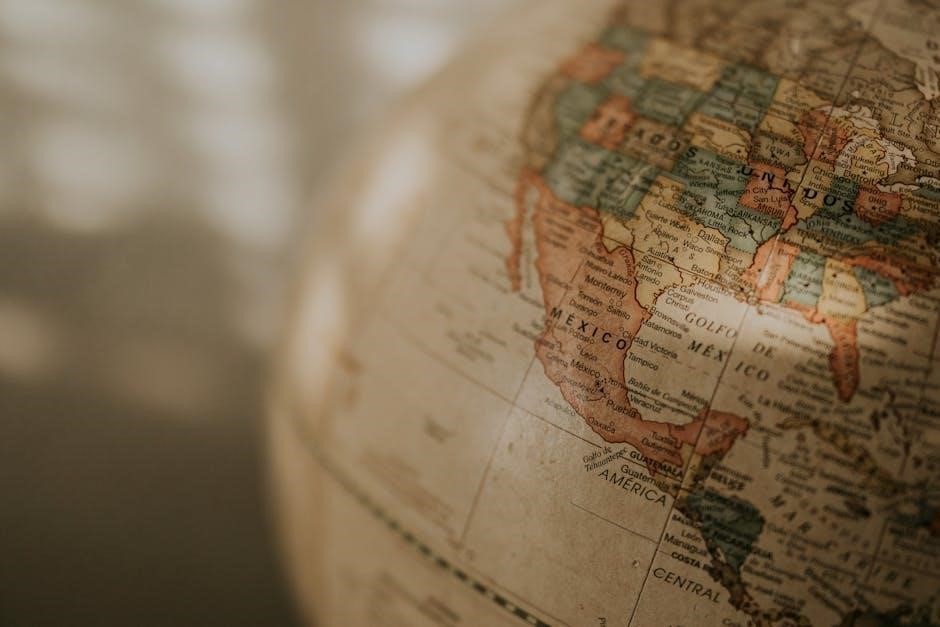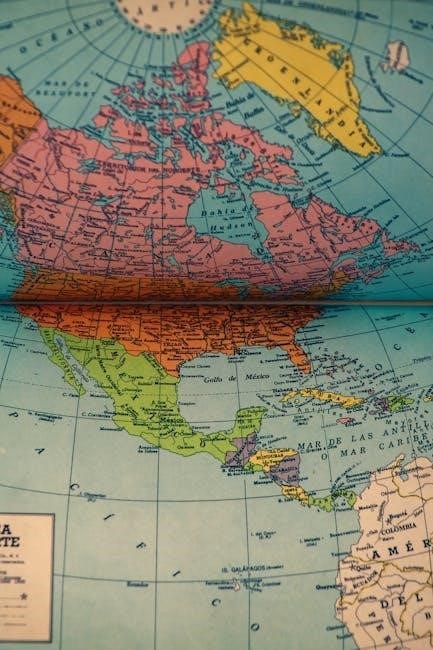This unit explores significant historical periods, focusing on key themes such as empires, revolutions, and global interactions. It examines cultural, social, and economic systems that shaped the modern world, providing a foundation for understanding historical continuity and change. Effective search strategies and keyword usage are essential for researching topics within this unit, ensuring access to relevant resources and information.
1.1 Overview of Unit 6
Unit 6 provides a comprehensive survey of world history, focusing on empires, revolutions, and cultural exchanges. It explores key historical events and their global impact, emphasizing the use of keywords and search strategies to effectively research topics. This unit offers insights into social, economic, and political developments, ensuring a deeper understanding of historical events and their modern implications.
1.2 Key Themes and Concepts
Unit 6 delves into empires, revolutions, and global interactions, emphasizing the rise and fall of empires and their cultural legacies. It explores major revolutions and their societal impacts, alongside global conflicts and their consequences. The unit also examines intellectual movements and economic systems, highlighting the importance of search strategies to uncover relevant historical resources and analyze these themes effectively.
1.3 Historical Period Covered
Unit 6 spans the 15th to 18th centuries, focusing on the Age of Exploration, colonialism, and the rise of global trade networks. It covers the Renaissance and Reformation, as well as early modern empires, highlighting their cultural, political, and economic impacts. This period also saw significant population shifts and the emergence of new global interconnectedness.

Major Historical Events
This section examines pivotal moments such as the Rise and Fall of Empires, the Protestant Reformation, and the Age of Exploration. These events reshaped global power dynamics and cultural landscapes.
2.1 Rise and Fall of Empires
The rise and fall of empires, such as the Roman, Mongol, and Ottoman Empires, shaped global power structures. Their expansion was driven by military prowess, administrative systems, and economic control. Decline often resulted from internal strife, external pressures, and resource depletion, leaving lasting legacies in culture, politics, and society. Understanding these cycles provides insights into historical and modern state formation.
2.2 Major Revolutions and Their Impact
Major revolutions, such as the French and Industrial Revolutions, transformed societies through political, economic, and social upheaval. The French Revolution ended absolute monarchy, promoting democratic ideals, while the Industrial Revolution reshaped economies and lifestyles. These events had far-reaching consequences, influencing governance, labor systems, and cultural norms, leaving enduring legacies in modern nation-states and global development.
2.3 Global Conflicts and Their Consequences
Global conflicts, such as World Wars I and II, reshaped territories, economies, and political systems. These wars caused massive human losses, economic devastation, and social upheaval. Treaties like Versailles and Potsdam redrawn borders, while the Cold War introduced ideological divisions. Colonial conflicts and decolonization further transformed global power structures, leaving lasting impacts on international relations and modern geopolitical dynamics.

Cultural and Social Developments
Unit 6 examines the evolution of intellectual movements, social changes, and cultural exchanges that shaped societies worldwide. It highlights how education, art, and ideas influenced human progress and modern identity, emphasizing the role of global interactions in fostering cultural diversity and understanding.
3.1 Intellectual Movements and Ideas
This section delves into the emergence of transformative intellectual movements, such as the Enlightenment and Renaissance, which reshaped human thought and societal structures. It explores how key ideas like reason, individualism, and progress influenced education, science, and governance, laying the groundwork for modern intellectual frameworks and global advancements in various fields, including technology and the arts.
3.2 Social Changes and Movements
This section examines the rise of significant social movements, such as abolition, women’s suffrage, and labor rights, that challenged existing norms and led to profound societal transformations. It highlights how these movements, often driven by grassroots activism and visionary leadership, reshaped legal frameworks, cultural attitudes, and political landscapes, fostering greater equality and justice across the globe.
3;3 Cultural Exchanges and Influences
Cultural exchanges between regions facilitated the sharing of art, religion, technology, and ideas. The Silk Road and maritime trade routes enabled cross-cultural pollination, spreading innovations like the printing press and gunpowder. These interactions fostered mutual understanding and enriched societies, while also introducing tensions. Such exchanges laid the groundwork for the diverse, interconnected world we see today, emphasizing the enduring legacies of cultural exchange.

Economic Systems and Trade
This section examines feudalism, capitalism, and industrialization, highlighting their economic impacts. It explores global trade networks and their significance in shaping historical and modern economies worldwide, fostering interdependence and growth.
4.1 Feudalism and Its Economic Impact
Feudalism was a decentralized economic system reliant on agriculture, with lords granting land to vassals in exchange for loyalty and labor. Serfs worked the land, producing goods for local use, while trade was limited. This system emphasized self-sufficiency, leading to minimal economic growth and a rigid social hierarchy that dominated medieval societies for centuries, shaping their economic structures and dependencies.
4.2 Rise of Capitalism and Industrialization
Capitalism emerged as a dominant economic system, emphasizing private ownership and profit. The Industrial Revolution accelerated this shift, introducing steam engines, factories, and mass production. New technologies and factories transformed societies, fostering urbanization and a shift from agrarian to industrial labor. This period marked the rise of global trade networks, reshaping economies and laying the groundwork for modern industrialized nations and their complexities.
4.3 Global Trade Networks and Their Significance
Global trade networks connected regions, fostering economic growth and cultural exchange. These systems enabled the exchange of goods, ideas, and technologies, shaping societies and economies worldwide. The expansion of trade routes, such as the Silk Road and maritime routes, facilitated the movement of resources, creating interdependence and laying the foundation for modern globalization and its complexities.

Political Structures and Governance
This section examines various government systems, the evolution of political ideologies, and the impact of colonialism. It highlights how different structures shaped global power dynamics and societal governance.
5.1 Types of Government Systems
This section discusses various forms of governance, including democracies, monarchies, and authoritarian regimes. It explores how these systems operate, their historical development, and their impact on societies. Understanding these structures helps explain how power is distributed and exercised, shaping political, social, and economic outcomes across different regions and cultures throughout history.
5.2 Evolution of Political Ideologies
This section examines the development of major political ideologies, such as liberalism, conservatism, socialism, and fascism. It traces their origins, key principles, and historical contexts, highlighting how these ideologies have shaped governments, societies, and global interactions. Understanding their evolution provides insight into the political and social changes that have defined modern history and continue to influence contemporary governance.
5.3 Colonialism and Imperialism
Colonialism and imperialism shaped global power dynamics, with European nations expanding their territories and influence. This period saw resource exploitation, cultural exchanges, and resistance from colonized regions. Key events include the Scramble for Africa and Asian conquests, driven by economic and political ambitions. Diplomacy and rivalries fueled these expansions, leaving lasting impacts on modern nation-states and global relations.
Technological Advancements
This section examines key inventions and innovations that transformed societies. The printing press spread knowledge, while steam power and electricity drove industrialization. These advancements reshaped daily life and global progress.
6.1 Major Inventions and Innovations
The compass enabled global navigation, while the printing press spread knowledge widely. The wheel revolutionized transportation, and the stirrup transformed warfare. Gunpowder and the telegraph were pivotal in shaping military and communication advancements. These inventions laid the groundwork for industrialization and modern technological progress, impacting societies and economies across the world.
6.2 Impact of Technology on Society
Technology transformed societies by improving education, communication, and productivity. The printing press democratized knowledge, while industrial machinery reshaped economies. Digital advancements enabled global interconnectedness, fostering cultural exchanges and economic growth. Societies adapted to these changes, balancing progress with challenges like resource inequality and ethical concerns, ultimately shaping the modern world’s complexities and opportunities.
6.3 Technological Diffusion Across Regions
Technological diffusion facilitated the spread of innovations across regions, transforming societies and fostering global connections. The printing press, for instance, disseminated knowledge widely, while industrial technologies reshaped economies. This process often occurred through trade, migration, and cultural exchanges, enabling regions to adapt and integrate new tools, leading to societal advancements and economic growth, while also addressing challenges like inequality and resource access.

Environmental and Demographic Changes
This section explores historical shifts in population and environmental impacts, examining how human activity and climate change shaped societies and migration patterns across regions and time periods.
7.1 Population Shifts and Migration Patterns
Migration patterns and population shifts have historically been driven by environmental factors, economic opportunities, and political upheaval. Mass movements of people, such as diasporas and forced relocations, significantly shaped cultural diversity and societal development. These shifts often resulted in cultural exchanges, labor redistribution, and the blending of traditions, influencing the modern global landscape and its demographic composition.
7.2 Environmental Impacts of Human Activity
Human activities, such as deforestation, industrialization, and agriculture, have significantly altered ecosystems, leading to biodiversity loss and resource depletion. These practices have caused long-term environmental degradation, including pollution and habitat destruction, which have far-reaching consequences for global health and sustainability. Understanding these impacts is crucial for addressing contemporary environmental challenges and promoting sustainable practices.
7;3 Climate Change and Its Historical Effects
Historical climate fluctuations have shaped human societies, influencing migration, agriculture, and cultural development. Events like the Little Ice Age impacted European agriculture, while regional droughts and famines drove societal collapse. Understanding past climate patterns helps contextualize contemporary environmental challenges and informs strategies for sustainable adaptation and resilience in an ever-changing world.
Key Figures and Their Influence
Leaders, thinkers, and revolutionaries have shaped the course of history through their ideas and actions, leaving lasting legacies that continue to influence modern society and politics.
8.1 Influential Leaders and Rulers
Charismatic leaders like Napoleon Bonaparte and Mao Zedong reshaped nations through military conquest and ideological reforms. Visionary rulers such as Mahatma Gandhi and Cleopatra inspired movements and redefined power dynamics. Leaders like Julius Caesar and Genghis Khan left enduring legacies, while Queen Elizabeth I exemplified strong governance. Their decisions shaped societies, politics, and culture, leaving lasting impacts on the modern world.
8.2 Important Thinkers and Intellectuals
Pioneering thinkers like Aristotle and Plato laid the groundwork for Western philosophy, while Newton and Einstein revolutionized science. Marx and Engels shaped modern political thought, and Gandhi inspired non-violent resistance. Figures like Confucius and Martin Luther King Jr. influenced ethics and societal change, leaving lasting legacies in their respective fields and beyond.
8;3 Revolutionary Figures and Their Roles
Revolutionary figures like Lenin, Mao Zedong, and Che Guevara played pivotal roles in shaping modern history. They led movements that overturned existing systems, advocating for radical change and inspiring widespread societal transformations. Their ideologies and actions reshaped political landscapes, leaving lasting impacts on global governance and social structures, while influencing future movements and leaders in profound ways.
Global Interactions and Conflicts
Global interactions involve cooperation and conflict between nations, shaped by economic rivalries, cultural exchanges, and the quest for power, influencing historical and contemporary international relations significantly.
9.1 Regional Conflicts and Their Global Impact
Regional conflicts often escalate into global issues, affecting trade, diplomacy, and security. For example, local disputes over resources or territory can lead to international interventions, economic sanctions, or humanitarian crises. Such conflicts highlight the interconnectedness of the modern world, where regional instability can have far-reaching consequences, shaping global policies and alliances. Historical and contemporary examples illustrate this dynamic.
9.2 Diplomacy and International Relations
Diplomacy involves negotiation and dialogue between nations to maintain peace and resolve conflicts. Historical examples, such as the Congress of Vienna, demonstrate its role in reshaping global alliances. Effective diplomacy prevents escalation of regional disputes into broader conflicts, fostering cooperation and mutual understanding. Modern international relations rely on organizations like the United Nations to promote diplomacy and address global challenges collectively.
9.3 Economic Rivalries and Their Consequences
Economic rivalries between nations often stem from competition for resources, markets, and trade dominance. Historical examples include colonial empires vying for territories and the Cold War-era economic race. These rivalries can spur innovation but also lead to trade wars, tariffs, and military tensions. Balancing economic interests with diplomacy is crucial to prevent escalation and maintain global stability and cooperation.

Modern World Formation
The modern world is shaped by historical legacies, including colonialism, industrialization, and global conflicts. These factors influenced the formation of nation-states, economic systems, and cultural identities, creating a interconnected, yet diverse global society. Understanding these roots is essential for addressing contemporary challenges and fostering a cohesive international community.
10.1 Legacies of Historical Events
Historical events have left lasting impacts on modern society, shaping political structures, economic systems, and cultural identities. The effects of colonialism, industrialization, and global conflicts continue to influence contemporary issues. Understanding these legacies requires effective search strategies, using specific keywords to uncover relevant resources and connections between past and present challenges, fostering a deeper understanding of their enduring influence.
10.2 Formation of Modern Nation-States
The emergence of modern nation-states was shaped by historical events, political ideologies, and the pursuit of sovereignty. These entities are defined by territorial boundaries, centralized governance, and self-determination. The evolution of nation-states has influenced global politics, economies, and cultures, establishing frameworks for international relations and modern governance systems that continue to shape the world today effectively.
10.3 Contemporary Issues Rooted in History
Modern challenges such as global inequality, climate change, and political instability often trace their origins to historical events. The legacies of colonialism, industrialization, and past conflicts continue to shape current issues. Understanding these historical roots is crucial for addressing contemporary problems effectively and fostering global cooperation to mitigate their impacts on societies and the environment. Historical context remains vital.
